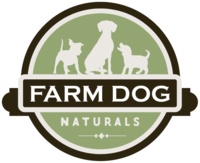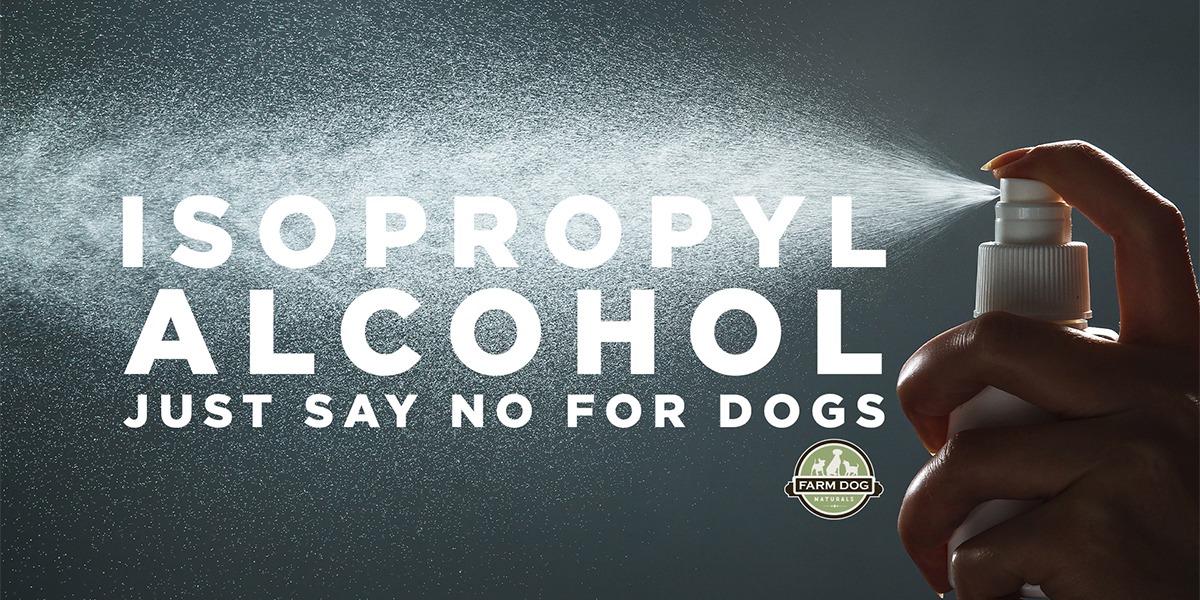It’s important to pay attention to the ingredient list in your pet products.
If you do, you may have noticed that isopropyl alcohol, otherwise known as rubbing alcohol, is finding its way into many dog care products.
You may be wondering, “What’s the big deal with that?”
I was shocked to see a question on Google that asked, “Can you put rubbing alcohol (isopropyl alcohol) on a dog to make him stop licking?” Then I read about a woman who uses isopropyl alcohol to mix the edible frosting colors for a dog birthday cake.
Isopropyl alcohol is a surprisingly common ingredient in pet products. But can you use isopropyl alcohol on dogs? The bad news is that it can effect your dog in some dangerous ways. The good news is there are some simple alternatives to using isopropyl alcohol in your pet’s products.
Can You Use Isopropyl Alcohol On Dogs?
Isopropyl alcohol can be very toxic to dogs. When you look at the isopropyl alcohol Material Safety Data Sheet, you’ll read that possible side effects can include:
- Drowsiness
- Unconsciousness
- Death
And they clearly state, “Gastrointestinal pain, cramps, nausea, vomiting, and diarrhea may also result.”
Skin contact can lead to “skin irritation with redness and pain. May be absorbed through the skin with possible systemic effects.”
Even breathing it is dangerous: “Exposure to high concentrations has a narcotic effect, producing symptoms of dizziness, drowsiness, headache, staggering, unconsciousness and possibly death.”
Yeah, that’s no good. This is not something I’d ever put on my dog’s skin. Especially somewhere she can inhale or lick it.
Alcohol In Pet Products
Despite the warnings and the research … isopropyl alcohol has been sneaking its way into the cosmetics industry for years. And now it’s found a nice cozy bed in the pet care industry.
The world of alcohol is vast, with many different types of alcohol. And they all serve their purpose in each specific industry that uses them. Alcohol is used as a:
- Solvent (a substance that dissolves another substance)
- Antiseptic
- Humectant (a substance that helps retain moisture)
- Preservative
But the scary part is how alcohol delivers ingredients into the skin. It does it by breaking down the natural oils and antibacterial layer. This means it destroys your dog’s skin microbiome, making her susceptible to all types of skin infections.
Forms Of Alcohol
Different forms of alcohol are not all created equal. When most people see alcohol on a label they think of drinking alcohol or spirits. Those are the opposite of isopropyl alcohol. Here are a few types of alcohols you’ll find.
1. Isopropyl Alcohol
Isopropyl alcohol is touted as a mild antiseptic, cleaner and disinfectant. It’s made through the hydration of water and a carbon called propene. This comes from fossil fuels like petroleum, natural gas and coal.
2. Ethanol Or Grain Neutral Spirits
Drinking alcohol is what the industry calls undenatured ethanol or grain alcohol. Most alcohol produced in North America is from corn. Natural alcohol can also come from other sources like:
- Fruits
- Sugar cane
- Potatoes
- Wheat
Grain alcohol or ethanol is available in different proofs. A grain alcohol’s proof is its ratio of alcohol to water. For example, 190 proof is 95% ethanol and 5% water. When you look at a bottle of alcohol in the liquor store, you’ll see that it says, “__ proof”. The proof is twice the percentage of alcohol. So, 80 proof would mean that the bottle contains 40% ethanol.
3. Alcohol In Herbal Tinctures
As an herbalist, I use alcohol to extract the active ingredients in plants to make herbal tinctures. My alcohol of choice is organic grain alcohol because it’s non-GMO and safe in small amounts. Tincture dosages for dogs are usually 1 to 3 single drops.
I prefer alcohol extractions for dogs.
- They’re easily absorbed into the bloodstream. That’s why I call alcohol extracts “predigested herbs.”
- Alcohol extractions don’t need heat, so the plant’s volatile oils are preserved. This makes the tincture more effective.
- And, with proper storage, alcohol tinctures have an unlimited shelf life.
Most dogs are fine with herbal tinctures. The small amount of alcohol makes them very safe. But if your dog doesn’t tolerate herbal tinctures well, here’s the solution.
Dilute the tincture dose with an equal amount of hot water. It’ll cause the alcohol to evaporate.
4. Organic Alcohol
Organic alcohol is the same as ethanol or grain alcohol, but the fermentation, distillation, and packaging processes use organic standards.
5. Methyl Alcohol or Methanol
Methanol is a highly toxic form of alcohol. It’s also known as wood alcohol. Methanol is used in antifreeze, as a solvent, an industrial cleaner, and in the synthesis of formaldehyde.
6. Denatured Alcohol
Denatured alcohol can be made of ethanol, or sometimes other chemically-classified alcohols that are not ethanol-based.
This type of alcohol is denatured by the addition of toxic solvents. This makes the alcohol unfit for consumption. Companies denature alcohol to avoid having to pay taxes. It also stops people from buying ethanol anywhere but a liquor store.
The chemicals used to denature vary. But the most popular are:
- Methanol
- Acetone
- Methyl isobutyl ketone
- Isopropyl alcohol (rubbing alcohol)
- Methyl ethyl ketone
Many of these added chemicals are nearly impossible to distill out of the alcohol. This makes them the toxins of choice for the denatured alcohol industry.
Why Using Isopropyl Alcohol on Dogs is a No-Go
Your dog’s skin rapidly absorbs isopropyl alcohol. It has several negative effects.
- Skin irritation and excessive dryness.
- Delays healing of skin tissue.
- Removes the skin’s naturally occurring moisture barrier.
- Can cause respiratory tract irritation when inhaled.
- Is a neurotoxin (harming the nervous system).
- Contains petroleum-based propene, which makes it unfit to drink and twice as toxic as ethanol.
- The liver oxidizes isopropyl alcohol into acetone. With prolonged exposure this process can damage the kidneys.
Other Names For Isopropyl Alcohol
Isopropyl alcohol goes by a few other names. So, look out for these names when you shop for dog products.
- Propyl alcohol
- Propanol
- Isopropyl alcohol
- Isopropanol
- 2-hydroxypropane
- 2-propyl alcohol
- Dimethyl carbinol
Pet Care Products With Isopropyl Alcohol
Many popular pet care products contain isopropyl alcohol. And even though some claim that using isopropyl alcohol on dogs, we’re going to disagree. We even found one that says “your dog will ask for it,” but my pug, Francis, has firmly verified that she would not.
Manufacturers love to use isopropyl alcohol for many other dog products:
- Hot spot care
- Muscle rubs
- Ear washes and flushes
- All types of skin treatments
- Skunk washes
- So-called “pet-safe” household cleaners
- Chewing sprays like Bitter Apple
- Different types of wipes
- Miracle urine cleaners
- Paw care products
- Wound care sprays
- Shampoos
- Floor cleaners
Are There Any Safe Alcohols for Dogs?
There’s another group of alcohols that are generally recognized as safe (GRAS). They’re made from natural fats and oils. This group of fatty alcohols has a different effect on the skin than their ethanol-based counterparts. Most fatty alcohols are emulsifiers (that blend liquids together) and emollients (skin softeners).
1. Cetyl Alcohol – Extracted from coconut oil, cetyl alcohol is a foaming emollient and emulsifier. It stabilizes or alters the formula it’s added to. It has a low occurrence of irritation.
2. Stearyl Alcohol – Stearyl alcohol is mostly made from coconuts, shea nuts, and sometimes, animals. It’s used as an emollient, emulsifier, and thickening agent. This alcohol is mostly solid at room temperature. It’s soothing and non-drying to the skin.
3. Cetearyl Alcohol – Cetearyl alcohol is an emulsifying wax. It’s derived from natural oils or fats. It’s very efficient as a stabilizing agent because it gives an emollient feel to the skin.
How To Avoid Isopropyl Alcohol In Dog Products
You can avoid isopropyl alcohol with a bit of care. There are natural solutions for every product that contains it.
1. Don’t buy any product that doesn’t provide a full ingredient list.
2. If you come across an ingredient you don’t know, the Environmental Working Group’s Skin-Deep database is an excellent place to start.
3. Look for these ingredients instead:
- Alcohol-free witch hazel
- Apple cider vinegar
- Hydrosols
- Aloe vera juice
- Vegetable glycerin
- Tea
- Purified water
4. If the product needs alcohol, look for grain or organic alcohol from plant sources.
As I said earlier, I use organic grain alcohol to extract plant ingredients when I make herbal tinctures. It’s non-GMO and it’s safe. There are many other types of alcohol that I haven’t covered. But isopropyl rubbing alcohol is the denatured alcohol you’ll find most in dog products.
The danger of using this form of alcohol definitely outweighs any benefit a manufacture could conceive.
Always Read Labels
Even though some labels can be disheartening, you must read them each time you buy something new. Or even something that you’ve used for a long time. Manufacturers love to change ingredients when you’re not looking.
It’s up to you as a dog owner. You have to do the work it takes to protect your dog from the dangers of modern industry.

